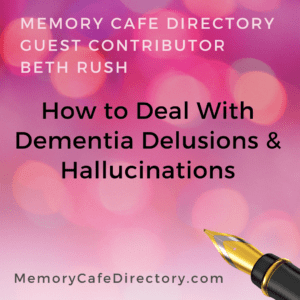Memory Cafe Directory posts and/or links to retailers can be advertising, sponsored, or affiliate links. We may earn a small commission from them. Thank you.
Delusions affect those with Alzheimer’s disease, Vascular dementia, and other types of dementia. These episodes cause behavior changes and potentially dangerous situations. Fortunately, there are ways to manage these situations as part of your dementia care. The best treatment for these memory problems depends on the individual, so tailoring the solution is essential.
Here’s how to deal with dementia delusions and what causes these episodes.
How to Deal With Dementia Delusions
Dementia delusions can be unpredictable. Managing sudden changes and aggressive behavior is critical for these episodes, so here are nine strategies for dealing with them.
1 Minimize the Triggers
Family caregivers should control the environment to minimize triggers. Even tiny elements in the room can set off visual hallucinations and encourage false beliefs. For example, older adults with dementia may look in the mirror and not recognize themselves, thus sparking an episode. The TV or radio could be another cause of dementia delusions if they misinterpret the program and start believing it’s real.
Minimize triggers by being vigilant of their residence. Someone with dementia may be watching TV for a specific show, not knowing what programs follow. If you think the next one will trigger a form of paranoia, turn the TV off and suggest another activity, diverting the person’s attention.
Some triggers are more difficult to avoid, especially if they come out of necessity. For example, you may have to move to a new home or assisted living facility due to any number of health conditions. This change can be confusing and lead to paranoid delusions due to the anxiety and unfamiliarity of their new residence.
2 Make the Living Space Safer
The first step toward making the living space safer is managing the TV, radio, and background noise. Prepare the environment before delusions to ensure your safety and that of everyone else in the residence. For example, the kitchen may have knives and other objects capable of causing harm if visible during visual hallucinations. Keep these items out of sight so they’re not easily accessible. If necessary, lock them away and keep the key with you.
Other strategies to incorporate into your daily routine for making the home safer include:
- Lighting: Dim and dark rooms can spark confusion and breed paranoid delusions. Ensure the area is well-lit with bright lighting, especially in the most commonly used places. Try using night lights in case they have to use the restroom or start to wander. Increasing visibility reduces the risk of tripping and falling over objects.
- Labeling: Labeling objects is a superb idea when dealing with dementia delusions. This tactic reduces confusion by notifying what’s behind each door, cabinet and drawer. Labeling helps those with memory loss and maintains a calm environment. False perceptions can be reduced through these constant reminders.
- Safety upgrades: People with dementia delusions benefit from different ways to improve safety around the residence to ensure they don’t injure themselves. For example, use locks on the windows and doors to prevent an accident from occurring during an episode. Make your bathroom safer with handrails in the shower. These environmental factors can make a significant difference, regardless of the type of dementia.
3 Establish Routine and Familiarity
Preventing dementia delusions is difficult because of their unpredictability. One of the best ways to limit the chances of these episodes is to establish a routine. Familiarity provides comfort and reduces anxiety if everyone knows what to expect during their day. For instance, you could share meals at the same time of day, watch a favorite TV show and play games in the evening.
Familiarity also comes with the decor and overall structure of the residence. Keep the couches, cabinets and other furnishings the same to reduce anxiety. Significant changes to the layout can cause paranoia because they feel like they’re in a different house. If you must move to a new home, keep the decor simple so the brain can easily adjust. Straightforward design with simple patterns invokes a calm environment.
4 Offer Reassurance
There’s not much you can do to stop dementia delusions. One of the best ways to manage the situation is to offer reassurance and tell your loved one you’re there for them. Delusions can make them feel like they’re in a different universe, so having someone there for comfort is a significant help. Your reassurance assists them through these sensory experiences and will help bring them back to reality.
Sometimes, their paranoia may derive from something searchable or fixable. For example, the dementia delusion can make them think their favorite model train is missing. Not knowing where the item is can cause behavior changes or aggressive actions. Show them where the train is to mitigate their delusion. If it happens again, keep the object in an easily visible spot.
5 Reconsider Explaining
When considering how to deal with dementia delusions, you may feel tempted to explain the situation and describe what’s happening. While you have good intentions, the result could have unintended consequences. People who have various forms of dementia often feel like they’re in a reality completely different from you. Explaining to them what they see isn’t real could negatively affect them and worsen the situation.
Someone having a dementia delusion may feel antagonized if someone tells them what they see isn’t happening. Starting an argument could lead to aggressive behavior and violence if you’re not careful. Instead, practice active listening by letting your loved one describe what’s happening. Show empathy by expressing sorrow and validating their feelings.
In these situations, the last thing someone wants is to feel alone. Reconsider explaining reality to them because it could worsen the situation and encourage more difficult behaviors.
6 Distract Their Delusion
Sometimes, you can control or diffuse dementia hallucinations by offering a distraction. Engaging in another activity is a solid diversion to ease them back into reality without overwhelming their cognitive load. Be patient, especially for those with later stages of the disease. Find something they enjoy doing to stimulate their mind without agitating them. For example, play their favorite calming songs on a sound system or record player.
When in doubt, use activities for older people with dementia recommended by the Alzheimer’s Association. These tasks include:
- Reading
- Writing
- Board games
- Puzzles
- Knitting
- Painting
If they benefit from physical activity, take a short walk to get fresh air. Their trigger may derive from the current environment, so a change of scenery may be what you need to distract their delusion. Only do this when you think it will help the situation. If not, allow the episode to play out instead of worsening it.
7 Control the Temperature
Temperature is one factor you can control most of the time. People with dementia are at risk during hot and cold weather, so keeping a steady temperature is essential. A 2022 Environment International study says people with dementia are at high risk in the summer as it heats up. Researchers conclude the risk of dementia admission increases by 4.5% for every degree Celsius as the temperature rises.
Keep your residence ready for hot and cold weather, depending on the time of year and local climate. Homes in areas with hot and cold weather may benefit from a mini-split unit. These heating and air conditioning devices let you control the temperature in an individual room and tailor it to their needs.
Older adults may like their room on the warmer side, whereas some prefer cooler. Regardless, the temperature should stay between 65 and 78 degrees Fahrenheit. Warn family members ahead of time if they plan to visit because the residence may be too warm or cold for their liking. Stay comfortable by layering during the winter and wearing cool clothing in the summer. Cold water and ice packs help when the room feels too warm.
8 Write Down Their Experiences
While each delusion may be unique, they could have common denominators to help you understand what’s happening. This information may help you discover the root cause and lower the chances it will happen again. Write down what happens with each episode and see if there are commonalities. If not, you’ll still have documentation of what occurred so a health care professional can decipher it.
Remind yourself you’re not alone regarding dementia delusions. Other caregivers and people with various types of dementia deal with these situations daily. Scroll through online forums or join a support group to find people with stories similar to yours. They can suggest mitigation tactics and prevention methods to maintain a calm environment as much as possible.
9 Find Stress Relief
Support groups are a great way to relieve stress. Learning how to deal with dementia delusions can negatively affect your mental health. Hence, finding outlets to reduce your tension is critical. Take advantage of physical activity outside work to improve your health. For example, go for a walk with a friend or try gardening. Dance classes are another exercise method if you enjoy being in a large group.
Besides physical activity, speaking with a licensed professional is essential if you feel overwhelmed by your caregiving responsibilities. Your caregiver friends can also offer advice if you need it. Remind yourself you’re not alone in these experiences. Find your favorite form of stress relief and use it to your advantage.
What Causes Dementia Delusions?
Learning how to deal with dementia delusions is slightly more manageable if you understand the contributing factors. When you have a delusion, your brain envisions a false reality that feels authentic despite being inaccurate. Dementia causes paranoia and hallucinations. Each episode comes with its own characteristics, but they stem from the disease and the harm it does to the brain.
Potential causes of delusions depend on the forms of dementia. For example, your loved one may have frontotemporal dementia, damaging neurons in the brain’s frontal and temporal lobes. Research has shown it causes behavior changes commonly seen in delusions.
Lewy body dementia is another form of the disease associated with dementia. It stems from Lewy bodies accumulating in the brain, thus damaging cells by disrupting communication between them. People diagnosed with this condition are more likely to have hallucinations.
Dementia delusions and their frequency depend on how advanced the disease is. People in advanced stages are more likely to have visual hallucinations and delusions.
Is Treatment Available?
Some treatment for dementia delusions is available through a health care provider. Physicians may prescribe antipsychotic medications to target the brain’s chemical imbalances, thus decreasing the frequency of episodes. Research suggests this medication assists those with dementia in treating their symptoms. However, it’s essential to remember the Food and Drug Administration (FDA) has not approved medication combating delusions.
Anti-anxiety medication is another option for treating delusions. While this strategy might not directly target delusions, prescriptions can effectively reduce the chances of an episode happening. A doctor can determine if antipsychotic medications are appropriate for specific medical conditions. Choosing a suitable method can make life easier.
How to Deal With Dementia Delusions in the Modern Age
Delusions are challenging because people have a hard time understanding what’s going on. A warped perception of reality makes patients see and feel things that aren’t real. Fortunately, there are ways to mitigate these episodes and reduce their chances of happening. Speak to an experienced health care provider to discuss medication and treatment options.
About the Author
Beth Rush

Beth Rush
Beth Rush is the Managing Editor and Content Manager at Body+Mind.
Body+Mind features articles about diet, fitness, mental health, parenting and health care.
Become a Contributor!
 Do you want to be a Memory Cafe Directory contributor? If you have helpful information to share with our community, read about the guidelines, then get in touch to discuss what you have to offer.
Do you want to be a Memory Cafe Directory contributor? If you have helpful information to share with our community, read about the guidelines, then get in touch to discuss what you have to offer.
Thank you.





